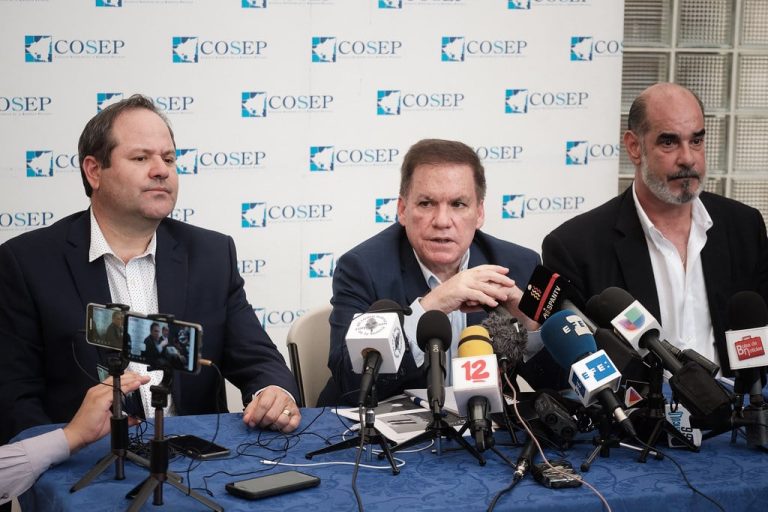13 de mayo 2022

Children of Exile: The Births “Sowing Hope” in the Camp of Nicaraguan Farmers

PUBLICIDAD 1M
PUBLICIDAD 4D
PUBLICIDAD 5D
The Ortega regime “has no scruples,” and will use any mechanism within their reach to “normalize” the country’s sociopolitical crisis.

The Ortega regime “has no scruples
On May 5, officials of the Central American Bank for Economic Integration (CABEI) hosted a meeting with large Nicaraguan businessmen and officials of the Ortega regime. This event, along with recent reports of the regime’s failed attempt to approach the United States government to negotiate sanctions relief, both demonstrate the Ortega regime’s continuing inability to control Nicaragua‘s sociopolitical crisis. In the regime’s eagerness to normalize the situation, the large business community has become their “economic hostages”, claim several analysts.
According to Enrique Saenz, an economist and former deputy, “it’s evident that the Nicaraguan business owners “have a pistol pointed at their heads”. They’re “harassed” by the General Tax Collection Agency, and they must cover high electrical energy costs, in addition to exorbitant fuel prices. As a result, Saenz cautioned, “it’s difficult to guess” whether they’ll opt to participate in the financing programs the CABEI is offering them.
“What is really clear is that Ortega is seeking a way to break up the opposition bloc, even if it be with this kind of ploys,” Saenz affirmed. On the other hand, there’s “an eagerness to make it appear that a process of economic normalization is underway. Like the government’s exchanges with the United States government, these efforts confirm that the economic situation remains out of Ortega’s control. He needs to give these signs of normality, try to show that things are moving along a good path,” Saenz added.
To seasoned political analyst and former Liberal Party deputy Eliseo Nuñez, the businessmen who participated in this meeting with the regime should be clear that the Ortega forces “are capable of anything, and that they have no scruples.” If the business owners are clear about this, he feels, they can go ahead, “but if they believe that this is a step towards wiping the slate clean and starting over, they’re very mistaken, and Ortega will make them pay,” he stressed.
The Ortega regime “doesn’t want the business leaders as partners; he wants them as hostages,” Nuñez pointed out. “At the moment, they’re not hostages like those currently in the El Chipote jail, but they’re economic hostages. If the day should come when they’re no longer of use to [Ortega] as economic hostages, then they’ll go on to become hostages in El Chipote, because Ortega has no scruples, and no interest in keeping his word,” the economist continued.
The failed attempt at rapprochement with the US carried out by Laureano Ortega, the governing couple’s son, is viewed by analysts as “an error in calculation” on the part of the regime. They were attempting to “shake off” the U.S. sanctions, at a moment when they felt they were “losing ground” on an international level.
These negotiations with the US “are now cut off”, Nuñez advised. In approaching the Biden administration, the Ortega regime sought “sanctions relief in exchange for the political prisoners”. The reason they attempted this approach was that “they see that the Latin American impact of the panorama with Russia and Ukraine has brought them great uncertainty, and they need to have something more concrete,” Nuñez stated.
“It’s no coincidence that these approaches were nearly parallel with those going on in Venezuela. They [the Ortega regime] at one moment were afraid of ending up with no international ground to stand on. However, once they saw their standing looking better again – since Venezuela didn’t reach a very open agreement with the United States, and Cuba is involved in some very unhurried negotiations – they once again closed themselves off,” Nuñez explained.
Saenz, for his part, pointed out that the failed attempt at rapprochement with the US indicates that “the sanctions on the fortune accumulated by the family in power are hurting them, and for that reason they’re trying to shake them off,” The regime is clear they “made a calculation error” by aligning themselves with Russia, and that this alliance “has deepened their international isolation,” Enrique Saenz underlined.
Another sign of the political, economic, and social crisis the dictatorship faces is that approximately 3% of the Nicaraguan people left the country in the second half of 2021 alone. The economist describes this migration as “a tragedy for the families”, one that’s on a path to become “the worst tragedy in Nicaragua’s history.”
Data for the first three months of 2022 shows that the tendency to migrate “is growing at an accelerated pace,” Saenz advised. “If that tendency continues for all of 2022, by the end of the year between 7 and 8% of the population will have left the country,” he added.
“Ortega encourages this hemorrhage. It takes the pressure off him in terms of unemployment and underemployment; it takes the pressure off him in terms of low salaries and the high cost of living; it takes the pressure off him because the majority of those who leave oppose his government; and it takes pressure off him because after a few months these people start sending remittances,” the economist detailed.
Meanwhile, in the country’s interior, the Ortega forces continue their attacks against non-governmental organizations. Because of this, Eliseo Nuñez warned: “all possibilities for association are being eliminated” in Nicaragua. They’re constructing a country designed to “allow absolute social control”.
This article was originally published in Spanish in Confidencial and translated by Havana Times
PUBLICIDAD 3M
Confidencial es un diario digital nicaragüense, de formato multimedia, fundado por Carlos F. Chamorro en junio de 1996. Inició como un semanario impreso y hoy es un medio de referencia regional con información, análisis, entrevistas, perfiles, reportajes e investigaciones sobre Nicaragua, informando desde el exilio por la persecución política de la dictadura de Daniel Ortega y Rosario Murillo.
PUBLICIDAD 3D